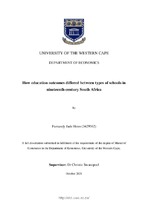| dc.contributor.advisor | Swanepoel, Christie | |
| dc.contributor.author | Henn, Furnandy Jade | |
| dc.date.accessioned | 2022-02-23T09:02:53Z | |
| dc.date.available | 2022-02-23T09:02:53Z | |
| dc.date.issued | 2021 | |
| dc.identifier.uri | http://hdl.handle.net/11394/8731 | |
| dc.description | Magister Commercii - MCom | en_US |
| dc.description.abstract | Economists have confidently agreed that the progression of human capital has an important effect on a state's productivity and growth. Moreover, current research proves the importance of educational outcomes throughout history. Therefore, measuring the quality of education throughout periods can test whether or not human literacy rates directly impact the long-run economic growth of a society.
South Africa’s current educational system stems from deeply rooted practices instilled in a previously colonised state. A new branch of economics in South Africa's context is economic history, which allows researchers to analyse previous historical events and make inferences regarding practices, laws, and phenomena occurring in the current era. | en_US |
| dc.language.iso | en | en_US |
| dc.publisher | University of Western Cape | en_US |
| dc.subject | Cape Colony | en_US |
| dc.subject | Education | en_US |
| dc.subject | Literacy rates | en_US |
| dc.subject | Illiteracy | en_US |
| dc.subject | School attendance | en_US |
| dc.title | How education outcomes differed between types of schools in nineteenth-century South Africa | en_US |
| dc.rights.holder | University of Western Cape | en_US |

